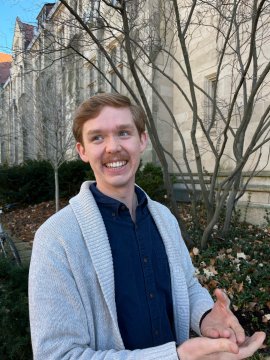A Glimpse at a Graduate Student Reading Group: Into the World of Kafka with Sam Landon


This past autumn, Sam Landon led a reading group of twenty-five graduate students who explored the puzzling and alienating worlds of Franz Kafka. We sat down with Sam to learn more. A graduate student at the University of Chicago Divinity School and a student program coordinator for the Lumen Christi Institute, Sam has also assisted with the Newman Forum program for high school students.
LCI: What’s your program and can you tell us about some of your intellectual projects?
SL: I'm an MA student at the University of Chicago’s Divinity School, specializing in the New Testament and Early Christianity. My project is situated in early ideas of the body, the relation between ecclesial and spiritual authority, and the interaction between Christian and Jewish communities, especially in the Greek and Syriac Fathers.
LCI: What’s your experience with LCI, and how has it intersected with your faith journey?
SL: I first learned about LCI before I was even Catholic, when I was in my first year of undergraduate studies, which I also did at the University of Chicago. I was intrigued by a poster for an LCI event titled "Angels, Demons, Heaven, and Hell: On Christian 'Mythology' and the Spiritual Life," since I was being drawn more and more towards apostolic Christianity at the time. I converted to Catholicism later that year in 2018. Eventually, I was drawn back to LCI in the capacity of helping the Newman Forum program.
LCI: Can you tell us more about working with the Newman Forum, and how have you witnessed students' faith impacted by these programs?
SL: Most of my LCI projects have been assisting at the Newman Forum events for high school students. I value this experience because it lets me see the faith of my younger Christian brothers and sisters. One anecdote that jumps to mind is how a conference we held for high school students earlier in 2023 ended with Adoration. Seeing dozens of students in quiet prayer was beautiful. Students voiced their appreciation of the opportunity to rest in Christ's presence and talk with him about what they just learned. Some students shared that this was their first experience ever of Adoration.
LCI: Why did you choose Kafka for the reading group you led?
SL: Kafka is a weird guy, and that's enough of a reason to want to read him. A classic question is, how much is he influenced by religious thought, especially Christianity and Judaism? He integrates those themes with the modern world and its relationship to tradition. I'm primed to see religious and especially Christian readings in Kafka, so I wanted to discuss those and other possibilities with other students.
LCI: Do you think LCI's student reading groups are valuable to the culture at the University of Chicago?
SL: I think LCI’s reading groups are one of the most effective ways that students can deal with the "big questions." This is a quintessential UChicago answer, but being told about texts and questions in secondary literature just doesn't bring you into a discussion the way that engaging with primary sources does. Further, reading groups like those at LCI show students that they can engage with these big questions in community.
LCI: Who’s coming to these reading groups? How are they forming community?
SL: One of the great strengths of these reading groups is that they bring students into the LCI circle who wouldn't otherwise be there. As I said, I was initially drawn to LCI because of an event that discussed medieval Christian thought, but that's not everyone's wheelhouse. The Kafka group drew several students who had never been to LCI before. They saw a poster and a title, thought it was interesting, and showed up! Now, they’re part of the more intimate community of Gavin House and LCI. Reading groups are a great “on-ramp” to the rest of LCI's programming – and thus to the Catholic intellectual tradition.
LCI: What were some questions or new insights that emerged from the group discussion of Kafka?
SL: I'll never think about law the same way again. Without getting too detailed, I think that Kafka presents a view where (some) law is, on a certain level, unknowable and thus adherence to it is an act of faith. I still wonder whether this view only works in a religious context or outside of that context as well. One debate that emerged from the group was whether political readings of Kafka are accurate or helpful. I'll keep my own position close to the chest, but that earnest disagreement within the small community was productive for everyone!